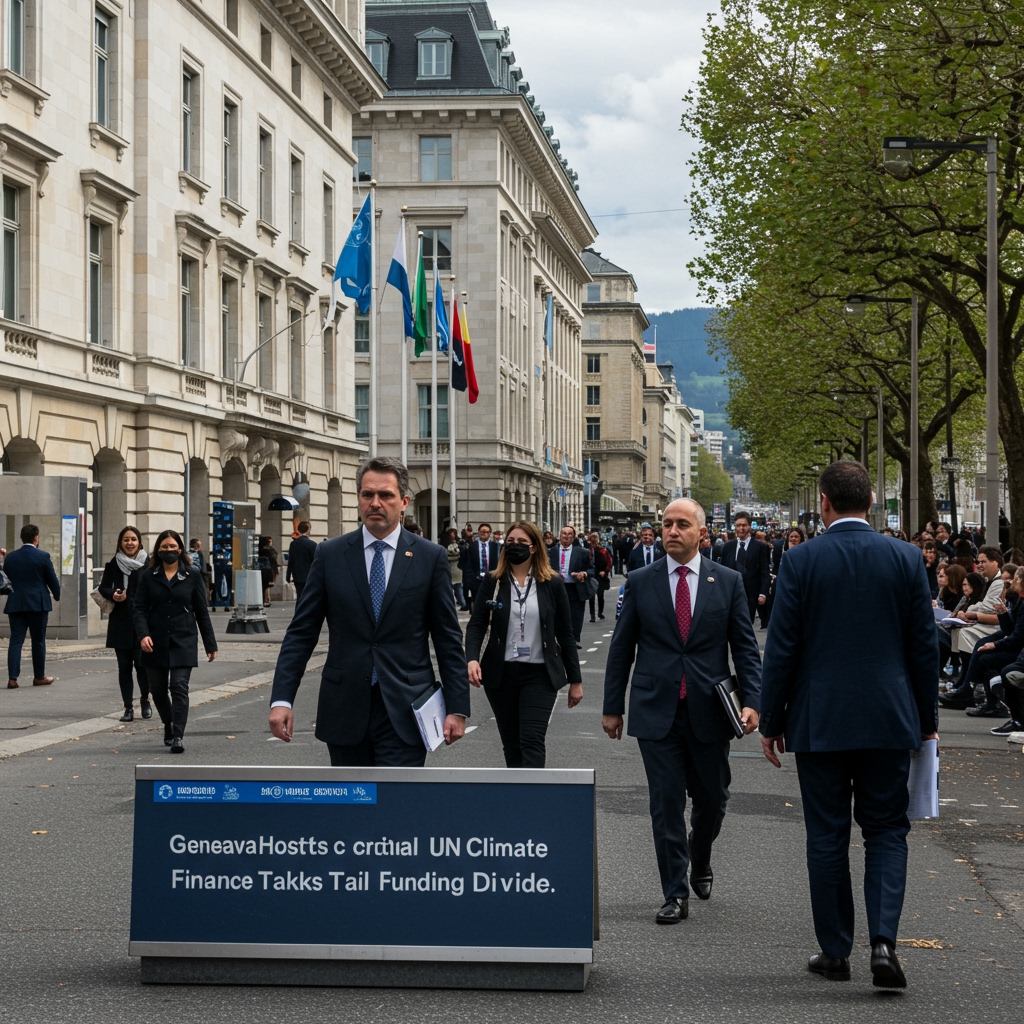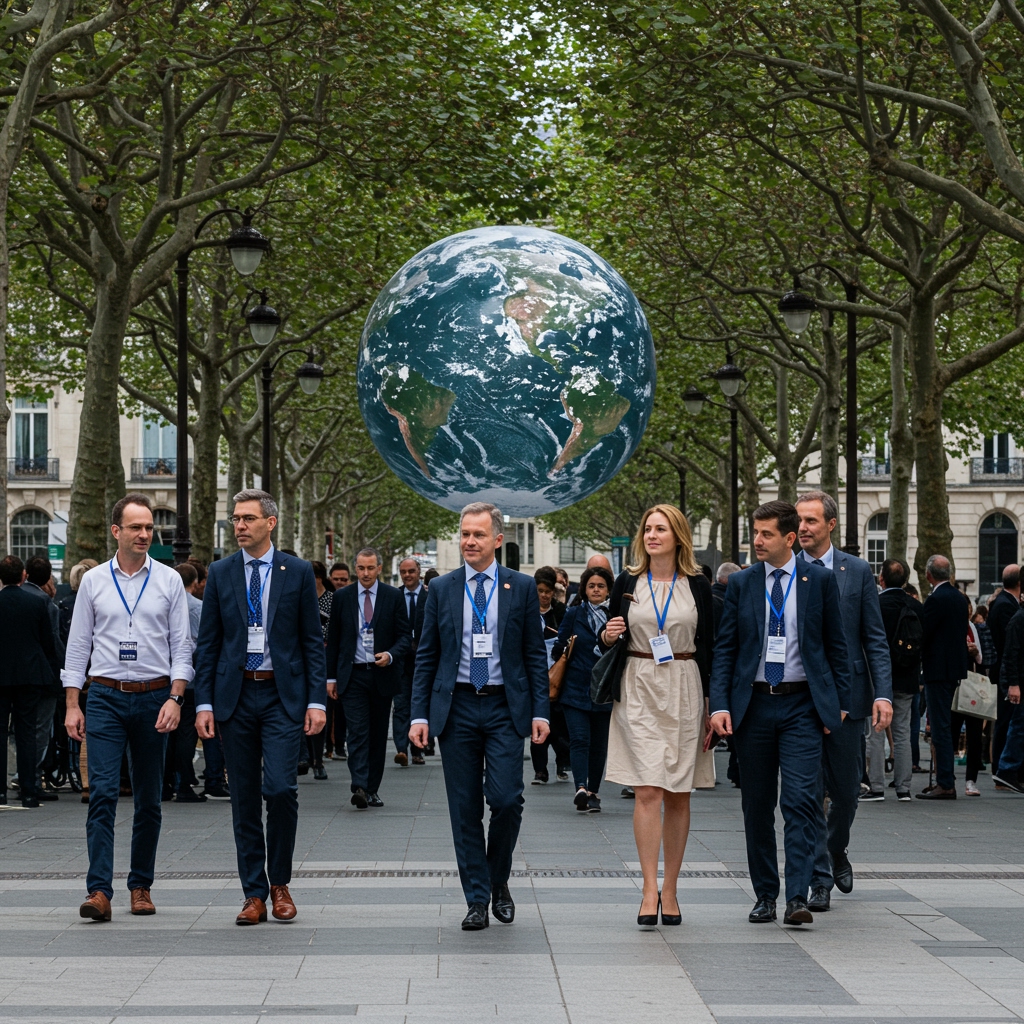Global Powers Converge in Geneva for Pivotal Climate Finance Negotiations
GENEVA – Representatives from nearly 200 countries have convened in Geneva this week for a critical round of negotiations under the umbrella of the United Nations Framework Convention on Climate Change (UNFCCC). These high-stakes discussions are primarily focused on establishing concrete, operational mechanisms for climate finance and addressing the increasingly urgent issue of loss and damage within the framework of the Paris Agreement.
The Geneva talks represent a crucial juncture in global efforts to combat climate change, highlighting the deep divisions and complex challenges inherent in securing the necessary financial resources to support vulnerable nations. As climate impacts intensify globally, the debate over who pays, how much, and through which channels has become a central point of contention in international climate diplomacy.
The Core Mandate: Finance and Addressing Loss & Damage
Climate finance is widely recognized as a vital enabler for developing countries to implement their climate action plans, encompassing both mitigation efforts (reducing emissions) and adaptation strategies (coping with the impacts of a changing climate). The Paris Agreement explicitly acknowledges the need for financial support from developed countries to assist developing ones.
Beyond mitigation and adaptation, the concept of loss and damage addresses the irreversible impacts of climate change that cannot be adapted to, such as permanent displacement, cultural loss, and destruction of infrastructure from extreme weather events or slow-onset changes like sea-level rise. Establishing mechanisms to address these impacts, including potential financial support, is a relatively newer but rapidly escalating priority for vulnerable nations.
The current negotiations in Geneva aim to translate these broad commitments within the Paris Agreement into tangible, operational financial frameworks. The success or failure of these talks will significantly influence the pace and ambition of global climate action.
Developing Nations’ Unified Call: A Dedicated Fund
The G77+China bloc, representing the collective interests of developing nations, has arrived in Geneva with a clear and unified position. They are strongly advocating for the establishment of a dedicated fund specifically aimed at addressing loss and damage. Their proposal emphasizes the need for new and additional financial resources, distinct from existing development aid.
A central element of the G77+China proposal is a specific financial target: they are calling for an initial capitalization of the proposed fund to reach $100 billion by 2030. This substantial sum is deemed necessary to provide meaningful assistance to the most vulnerable states currently facing the brunt of intensifying climate impacts, despite having contributed the least to historical emissions.
Developing nations argue that a dedicated fund is essential for ensuring predictable, adequate, and accessible finance tailored to the unique challenges of loss and damage, which they contend are distinct from traditional adaptation needs. They emphasize principles of climate justice and common but differentiated responsibilities, highlighting the historical carbon emissions by developed nations as a key driver of the current climate crisis.
Developed Nations’ Reservations and Alternative Approaches
In contrast to the G77+China’s proposal for a new, dedicated fund, several developed countries, including prominent members of the G20, have expressed significant reservations. Their concerns often revolve around the scale of the proposed fund, its governance structure, and the potential for fragmentation within the international aid landscape.
Instead of creating entirely new financial architecture, these developed nations largely favor integrating finance for loss and damage within existing aid frameworks and climate finance mechanisms. They argue that leveraging existing structures could be more efficient, avoid duplication, and ensure better coordination of financial flows. Some also raise questions about the scope of activities the fund would cover and criteria for eligibility.
The reluctance stems partly from debates over burden-sharing among developed countries, the definition of what constitutes finance for loss and damage versus adaptation, and the sheer financial commitment involved, especially against the backdrop of other global economic pressures.
High Stakes and Pressure for Progress
The negotiations in Geneva are undeniably high-stakes. A failure to reach consensus on credible and effective financial mechanisms could severely undermine trust between developed and developing nations, potentially jeopardizing broader cooperation under the Paris Agreement. Developing countries argue that without adequate financial support, ambitious mitigation and adaptation goals are simply unattainable.
There is significant pressure on delegates this week to move beyond rhetorical commitments and deliver tangible progress. Finding a compromise that bridges the gap between the demand for a dedicated, substantial fund and the preference for leveraging existing structures is the core challenge facing negotiators.
The discussions require navigating complex technical details, political sensitivities, and differing views on historical responsibility and future obligations.
The Road Ahead in Geneva
The talks, which began this week, are scheduled to continue with intensive sessions aimed at hammering out the details of potential financing mechanisms. The technical and political complexities mean progress is often incremental.
The current round of negotiations in Geneva is a critical step in a longer process, but the deadline for tangible outcomes is looming. The discussions are officially scheduled to conclude on January 24, 2025. The outcome of these talks will inform subsequent high-level climate summits and ultimately impact the world’s ability to effectively address the escalating climate crisis and support those most vulnerable to its impacts.





